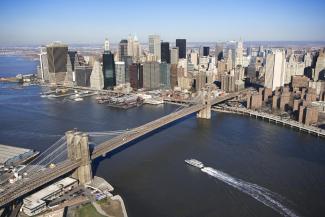
Do the preparation task first. Then read the text and do the exercises.
Preparation
Some of the biggest and most expensive transportation projects in the world have involved building bridges. Bridges are crucial links that carry cars, trucks and trains across bodies of water, mountain gorges or other roads. As a result, they are one of the most important aspects of civil engineering and are subject to intense scrutiny, especially when they collapse.
Bridge collapses can be tragic events, leading to loss of life and serious property damage. That's why bridge engineers, designers and builders must always take their jobs very seriously. The best way for them to prevent these accidents is to understand why bridges collapse in the first place. Understanding bridge collapses can lead to major changes in the design, construction and safety of future building projects. The following are main reasons why bridges fall.
Fire
Historically, more bridges were made of wood and were much more susceptible to fire. This was particularly true of old-fashioned train bridges, where the spark created by the steel wheels and steel tracks could sometimes cause a bridge to catch fire and burn to the ground.
During construction
A large number of bridge accidents occur during the construction of the bridge itself. These accidents are often due to an error made by the engineers, such as a miscalculation. The bridge collapses under its own weight, and this can be deadly for the workers on it at the time.
Earthquakes
Earthquakes damage all structures, including bridges. Luckily, this kind of collapse is relatively infrequent, especially with modern bridges. Engineers have learned to design bridges in earthquake zones on areas that are much more resistant to movement.
By defect
Some bridge collapses are mysteries, and engineers only realise why after they conduct a complete investigation. In some cases, this could happen because inferior-quality material was used in the construction, or because of a defect in a key piece of the bridge. In other cases, the bridge was designed only to support a certain amount of weight and no more.
Boat or train crash
Both of these kinds of accidents are extremely rare, but boats and trains can cause a bridge to collapse for different reasons. With trains, it's the velocity of the impact that can bring a bridge down. With boats, it's the very large mass they have that can bring about the collapse, even if they are moving very slowly when it occurs.
The best way to avoid bridge failures is to plan for them. Modern technologies that can detect structural weakness, safer working environments and better designs can all help to reduce these terrible accidents.




I think the most of bridges in my country are used inferior quality of construction materials. So the bridge collapse often cause in my country.
I have never visit a great bridge, but I think the Golden bridge of San Francisco is one of the most famous bridges in the world.
Hello, I am Eduardo I watch videos the bridge of San Fransisco in US, in México don´t have bridge fomous only the of Guasteca Potosina. in general my country the bridges are so bad the campany for save money does the construccion bad quality and the enggenir so a minioums the goverment. on april 3, 2021(yesterday was aniversari) collapse the line 12 the train in the city the México sanlees people death
Another reason we didn't talk about is the wind. In addition to construction defects, the wind can generate serious problems for this kind of construction, like skyscrapers. We can watch some videos on the internet in which bridges are simply destroyed by the flow of the wind. Sometimes bridges are bent literally and forced by the wind, they oscillate smoothly even if they are made of concrete and steel. Especially long bridges are affected by this terrible antagonist.
I have heard for a new bridge in Chanakale, Turkey but I never have a chance to visited. I also would like to visit a Love bridge in Paris but when I have a boyfriend :) And have a one reason for collapse the bridge and this is on purpose made with bobms.
The most famous bridges I know are London bridge of the UK and Khalifa bridge of the UAE. Yes I have visited them.
I know many bridges in India and other many countries. In India Habra bridge in West Bengal is famous but I never visited there.
In Paris a Love bridge I know about this. I sees photos and videos of this in internet. I about to go there.
Hello Finn Pete,
I don't see any question of pre-/postposition in your example. It appears you are asking only about which preposition is appropriate here and I would say that the collocating preposition is 'to': be subject to...
You can talk about something being 'a subject for an investigation', but that has a different meaning: subject to investigation means dependent or conditional on an investigation, while a subject for an investigation means it is a topic for an investigation.
Peter
The LearnEnglish Team